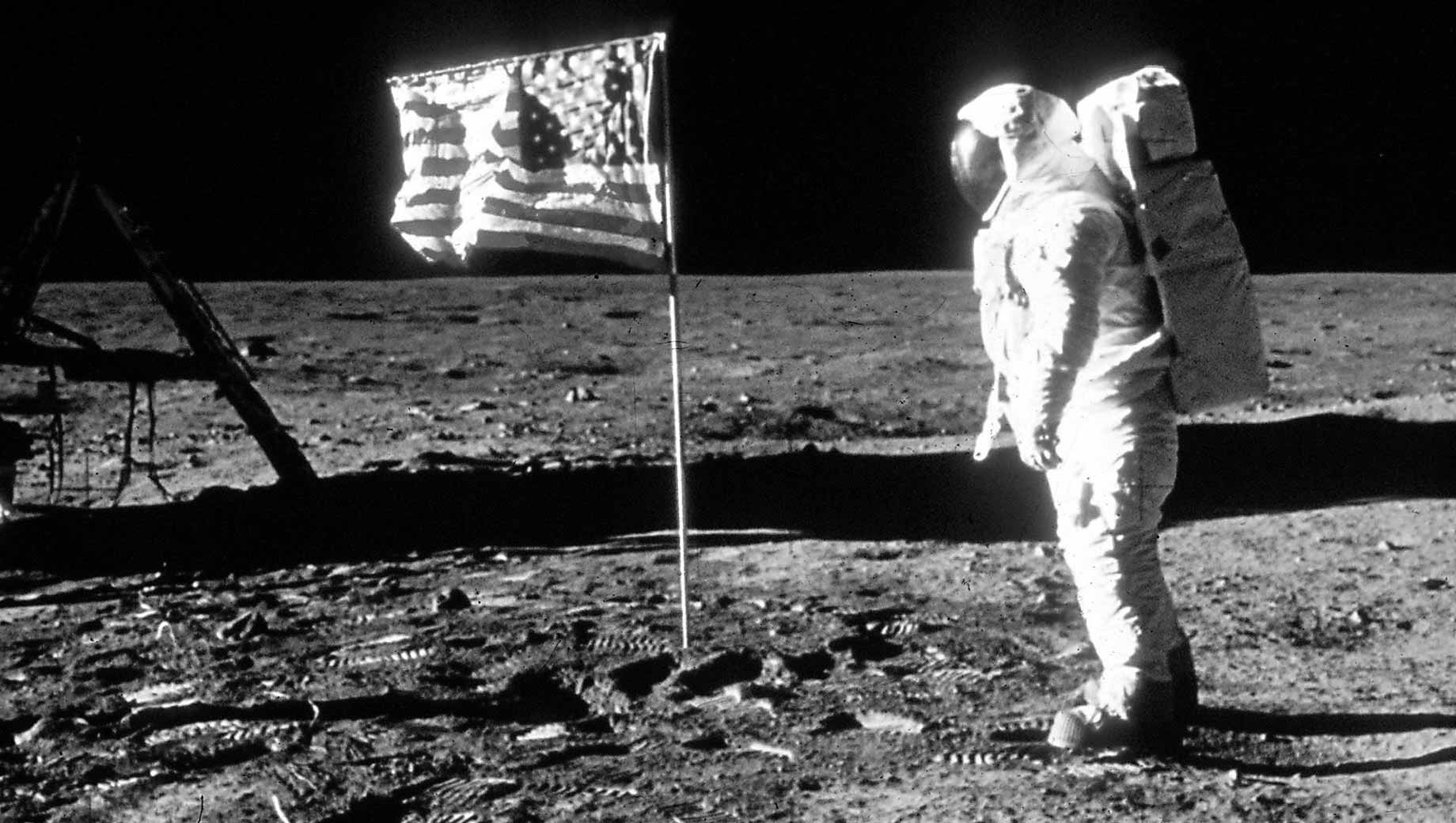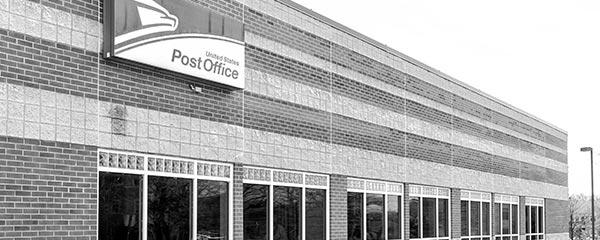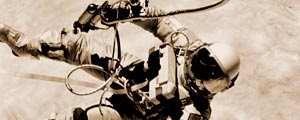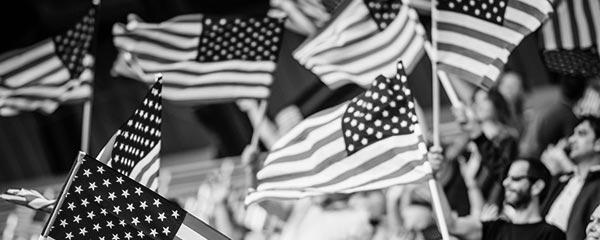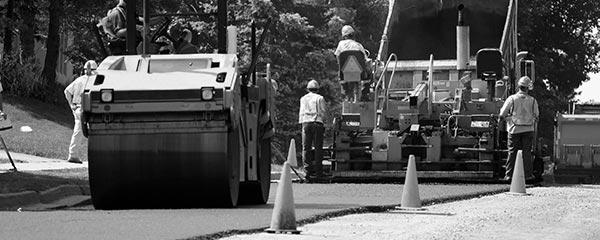Story Highlights
- 50 years after moon landing, record-high 64% say space costs are justifiable
- About three in four say NASA funding should be maintained or increased
- NASA receives its highest ratings in 20 years
WASHINGTON, D.C. -- With the 50th anniversary of the Apollo 11 moon landing approaching, a record-high 64% say the U.S. space program's costs are justifiable. Americans' views have grown increasingly positive over various Apollo 11 anniversaries since 1979.
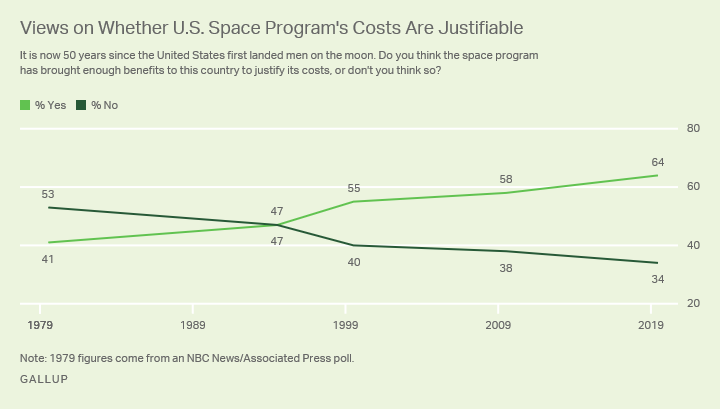
Americans have been less convinced of the justification of NASA's costs in the past. A 1979 NBC News/Associated Press poll conducted at the moon landing's 10-year anniversary found 53% of Americans saying the costs were not justified. Americans were split on the issue when ���۴�ýasked this question at the 25-year anniversary in 1994.
But with each successive anniversary, views of the costs being justified have grown -- to 55% at the 30-year anniversary in 1999, to 58% at the 40th anniversary in 2009 and to 64% today.
The Apollo mission in 1969 cost the U.S. a substantial $177 billion (in 2019 dollars), kickstarting innovations and advancements that have changed the face of many U.S. technology sectors in the decades since.
Beliefs that the space program's costs are justifiable have grown at the national level because of growing views of its benefits among older Americans. In the past, older U.S. adults were less likely than younger adults to perceive the program's costs as being justifiable -- but in the latest survey, all age groups have similar views, with 62% to 65% saying the costs are justifiable.
Most Americans Say NASA Funding Should Be Maintained or Increased
Americans are more likely to say funding for NASA should be kept as it is (50%) or increased (27%) than to say such funding should be decreased (16%) or ended altogether (6%).
The combined 77% wanting NASA spending maintained or increased is on par with 76% in January 1986, right after the Space Shuttle Challenger disaster; these points mark the highest in Gallup's trend. Only in 1993, after the loss of the Mars Observer, did less than half of Americans say NASA spending should be maintained or increased.
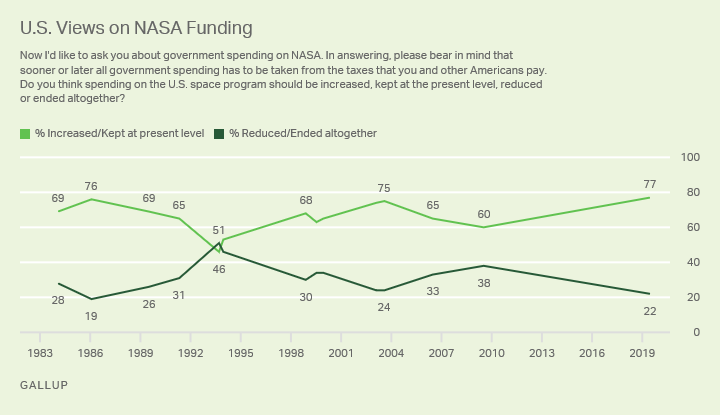
NASA Receives Its Highest Ratings in 20 Years
Sixty-three percent of Americans rate NASA's performance as "excellent" or "good" -- slightly higher than the 40% to 60% ratings for the agency since 1999.
NASA received its highest rating of 76% in 1998, just after astronaut John Glenn returned to space as the oldest man to do so. The low points for views of the program were 43% in 1993, after NASA lost contact with the nearly $1 billion Mars Observer, and 42% in 2013.
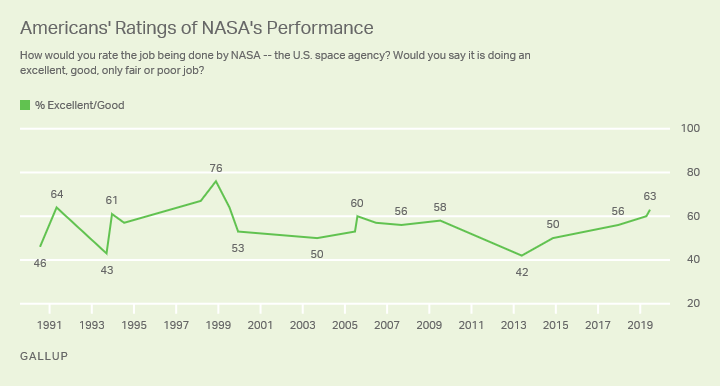
Two in Three Americans Correctly Identify First Man on the Moon
Sixty-six percent of Americans in the most recent poll correctly name Neil Armstrong as the first person to ever walk on the moon -- an improvement from 1999, when just half of Americans could name him.
One in 10 Americans come close, naming other important astronauts such as John Glenn (5%), the first American to orbit Earth, or Buzz Aldrin (4%), the second man to walk on the moon. One percent name Alan Shepard, the first American to go to space.
Twenty-five percent of Americans do not know the answer or guess someone else, the same percentage as in 1999. The major changes since then have been a decrease in the percentage mentioning Glenn and the increased percentage mentioning Armstrong.
| July 13-14, 1999 | June 19-30, 2019 | ||||||||||||||||||||||||||||||||||||||||||||||||||||||||||||||||||||||||||||||||||||||||||||||||||
|---|---|---|---|---|---|---|---|---|---|---|---|---|---|---|---|---|---|---|---|---|---|---|---|---|---|---|---|---|---|---|---|---|---|---|---|---|---|---|---|---|---|---|---|---|---|---|---|---|---|---|---|---|---|---|---|---|---|---|---|---|---|---|---|---|---|---|---|---|---|---|---|---|---|---|---|---|---|---|---|---|---|---|---|---|---|---|---|---|---|---|---|---|---|---|---|---|---|---|---|
| % | % | ||||||||||||||||||||||||||||||||||||||||||||||||||||||||||||||||||||||||||||||||||||||||||||||||||
| Neil Armstrong | 50 | 66 | |||||||||||||||||||||||||||||||||||||||||||||||||||||||||||||||||||||||||||||||||||||||||||||||||
| John Glenn | 13 | 5 | |||||||||||||||||||||||||||||||||||||||||||||||||||||||||||||||||||||||||||||||||||||||||||||||||
| Buzz Aldrin | 2 | 4 | |||||||||||||||||||||||||||||||||||||||||||||||||||||||||||||||||||||||||||||||||||||||||||||||||
| Alan Shepard | 4 | 1 | |||||||||||||||||||||||||||||||||||||||||||||||||||||||||||||||||||||||||||||||||||||||||||||||||
| Other | 3 | 4 | |||||||||||||||||||||||||||||||||||||||||||||||||||||||||||||||||||||||||||||||||||||||||||||||||
| No opinion | 28 | 21 | |||||||||||||||||||||||||||||||||||||||||||||||||||||||||||||||||||||||||||||||||||||||||||||||||
| GALLUP | |||||||||||||||||||||||||||||||||||||||||||||||||||||||||||||||||||||||||||||||||||||||||||||||||||
Bottom Line
Solid majorities of Americans feel that NASA's budget is justifiable and that it should be maintained or increased. The 1969 moon landing's upcoming anniversary may have elevated the historic achievement in Americans' minds as of late, as their recall of the first man on the moon is stronger than it was 20 years ago. Americans are also slightly more positive in their views of the space program's performance -- which could be key to seeing NASA's continued funding as the agency works toward achieving its next feat.
Learn more about how the works.
